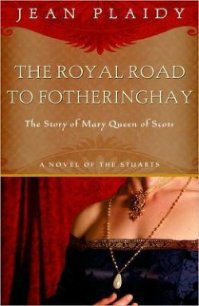In the Shadow of the Crown - Plaidy Jean (книги хорошем качестве бесплатно без регистрации .txt) 📗

WHEN I AWOKE NEXT MORNING, IT WAS TO FIND THAT HE was no longer beside me. There was a great commotion outside the door. My women were talking loudly, protesting.
I rose and went out to them.
Several Spanish gentlemen of Philip's entourage were standing there, being held at bay by my valiant ladies. They were trying to explain that it was a breach of etiquette to call on a lady the morning after her wedding.
I said, “I daresay it is a Spanish custom.” I would ask Philip when I saw him.
I could not imagine where he could be. I wondered if I might ask him what induced him to rise so early. I had hoped to wake and find him beside me. But I did not ask him. One did not ask Philip such things. For all my love for him, I felt there was a barrier between us. But I did discover later that it was a Spanish custom for certain gentlemen to come into the bridal chamber after the wedding night in order to congratulate the married pair.
I was learning that the customs of my husband's Court were very different from ours, but at that time I was amused by the differences and told myself how interesting it would be to learn each other's ways.
I was surprised when I did not see Philip all that day. I was told that he was busy attending to dispatches he had received from his father.
It was my duty to meet the wives of the gentlemen who had accompanied him, and I began with the Duchess of Alva. She was very elegant and rather alarmed me by her stately demeanor. But I was in love with all things Spanish. It was natural that I should be. I had Spanish blood in my veins. I remembered snatches of conversation I had shared with my mother years ago. She had been brought up in a Court which must have been very like that in which Philip had lived. I thought of how happy she would be if she could see me now.
The Duchess and I got on very well after a while. I suppose she was as nervous of me as I was of her. I had gone to meet her, which surprised her because she had expected to find me seated, and she did not know how to greet me. She sank to her knees and tried to kiss my hand, but I put my arms round her and kissed her cheek.
I meant to be warm and friendly but my manner seemed to disconcert her; however, after a while we were able to speak in a friendly fashion together.
It was very difficult to break through the solemnity of the Spanish, and I could see that this was going to be a problem with Philip. I could never be sure what he was thinking. He behaved with courtesy and gentleness toward me, yet he was never abandoned, never passionate. If I had not deluded myself, I could have feared that our marriage, our love-making, was to him a task, a duty which must be performed.
Later I believed this was so, for when he had gone, people talked more freely of him, and I have to admit that whenever possible I urged them to do so. There came a time when I felt a certain masochistic pleasure in torturing myself, when I wanted to learn the truth about my marriage.
Then I reminded myself that I was old and he was comparatively young… that I was to him a kind of maiden aunt.
But for the time being I was blissfully happy.
We left Winchester for London and crossed London Bridge at noon, surrounded by the nobility of Spain and England. We were greeted by the pageantry one grows accustomed to on such occasions; but what pleased the people most, I am sure, were the ninety-seven chests—each over a yard long—which contained the bullion Philip had brought with him.
We came to Whitehall, where celebrations continued. These were, however, cut short by the death of the old Duke of Norfolk. I insisted that the Court go into mourning. Poor Norfolk! The last years of his life had been very melancholy. After narrowly escaping being beheaded by my father, he had been a prisoner all through the last reign; and when I had come to the throne, he had been released but his luck had not changed. He had led an inferior force against Wyatt and had suffered the humiliation of being defeated, which would be heartbreaking for a man of his caliber. So it seemed right to put on mourning for an old friend.
At Windsor the ceremony of the Garter was officially performed, and I was happy to see Philip honored. I wanted to give him so much, which could seem only very little after all the happiness he had brought me.
Susan used to watch my exuberance with a certain fearfulness. I know I behaved like a young girl in love; but, if I was not a young girl, I was certainly in love, and older people's feelings can be so much stronger than those of the young, particularly when happiness comes to them late in life after much tribulation.
I wanted Philip to have a coronation. So did Renard, who came to see me about the matter and to stress what a good thing it would be.
“He would take so much of the burden from your shoulders. You have too much to contend with. You must see that he is given the status here that he so richly deserves.”
“I would willingly give it,” I said.
“There is nothing I want more. I will speak to the Council.”
I did.
Gardiner said, “The people would never accept it.”
“I am the Queen,” I reminded him. “I intend to rule as my father did.”
“It was different in your father's day. It is not long since people flocked to Wyatt's banner. There is your sister…”
“I know you want to have her…removed… but I will not allow that. She is not concerned with this. I am sure the country would welcome a king to help in governing them.”
“The time has not come…yet,” insisted Gardiner.
It was a sort of compromise. Not yet, he said. He must mean that we should wait awhile.
I had to admit that he was right, for after that first enthusiasm when we had our ceremonies and pageants, which people always enjoy, they began to display their dislike of foreigners in general and Spaniards in particular. It was said that there were more Spaniards than English in the streets of London. “England is for the English,” was their cry. “We want no aliens here.” Those who had come in Philip's train were rich, and that aroused the people's envy. Children called after them in the streets and threw stones at them. Quarrels were picked and there was frequent fighting. The Spaniards began to fear that it was unsafe to go out alone, for they were constantly being robbed.
I was ashamed of my countrymen, but Philip remained calm and as courteous as ever; he would not give up his Spanish household and, as I had provided him with English servants, he kept the two, which must have been a great expense; but as he could not easily dismiss those I had found and would not give up those he had brought, he accepted the cost.
I wished that we could have talked more openly together. I wished I had known what was in his mind. There were constant dispatches arriving from the Emperor. Philip would spend most of the day dealing with them. I saw very little of him except in company, and when we were alone in our bedchamber, very few words were spoken.
It was in September when I believed I might be pregnant. I had suffered through my life from internal irregularities, so I could not be sure, but I had a certain exultant feeling within me. I felt blessed, and I said to myself: This is what the Virgin experienced when she was visited by the angel.
This was what I had longed for. A child of my own! Everything I had endured… all my troubles… they were all worthwhile, if I could hold my own child in my arms.
I was afraid to say anything. I was fearful that it might not be so.
But it must be. Why else should I have this feeling of exultation?
SEPTEMBER PASSED. EACH DAY I became more sure. I wanted to sing out to the housetops, “My soul doth magnify the Lord …I am to have a child…a child of my own. It will be a son. It must be a son.” Oh, what rejoicing there would be! If only the time would pass more quickly. When could I expect the birth? Next May perhaps? The child would be my firstborn. Who knew? There might be others…




